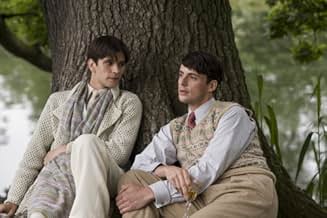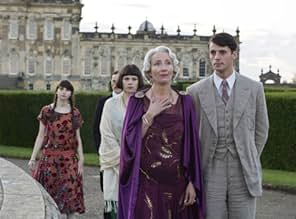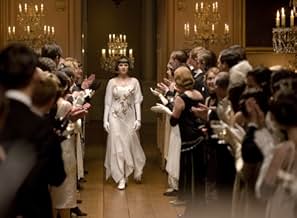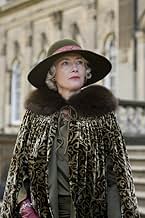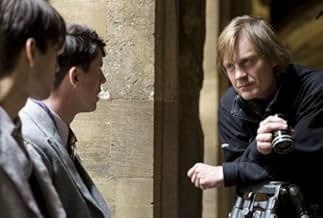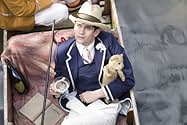PUNTUACIÓN EN IMDb
6,6/10
14 mil
TU PUNTUACIÓN
Un amor prohibido florece durante la Segunda Guerra Mundial.Un amor prohibido florece durante la Segunda Guerra Mundial.Un amor prohibido florece durante la Segunda Guerra Mundial.
- Dirección
- Guión
- Reparto principal
- Premios
- 11 nominaciones en total
Reseñas destacadas
Is this film a worthy interpretation of "Brideshead Revisited"? Well, up to a point, Lord Copper, as another one of Evelyn Waugh's characters was wont to say.
First, scriptwriter Andrew Davies, a past master of adaptation of great and not-so great literary works, has put the focus on the Charles and Julia love story rather than the Charles and Sebastian 'romantic friendship' as Cara, Lord Marchmain's Italian mistress puts it. The religious aspect is dealt with almost incidentally.
Second, Lady Marchmain, as played by Emma Thompson, is a very grim person with total emotional control over her children and whose particular Christian beliefs means that she is indifferent to their suffering as to her this life is a mere precursor to the glorious afterlife the same attitude as a 9/11 hi-jacker in fact. She has none of the sweetness that Claire Bloom brought to the 1981 TV series.
Third, some of the performances owe a good deal to those in the TV series, especially Matthew Goode as Charles who has an uncanny likeness to Jeremy Irons. And of course Castle Howard reprises its role as Brideshead. Some characters were reduced to ciphers; for example Bridey who played by Simon Jones stole several scenes in 1981 but the part is reduced to a non-entity here. Michael Gambon, a consummate actor, gives us a new take on Lord Marchmain to compare with Lawrence Olivier's earlier version.
Overall, though, I was left with the impression this film has not much to say which is new. Like the recent feature film version of "Pride and Prejudice", it gives a broad outline of the story but misses out much of the rich context provided by the minor characters. Oh, read the book instead.
First, scriptwriter Andrew Davies, a past master of adaptation of great and not-so great literary works, has put the focus on the Charles and Julia love story rather than the Charles and Sebastian 'romantic friendship' as Cara, Lord Marchmain's Italian mistress puts it. The religious aspect is dealt with almost incidentally.
Second, Lady Marchmain, as played by Emma Thompson, is a very grim person with total emotional control over her children and whose particular Christian beliefs means that she is indifferent to their suffering as to her this life is a mere precursor to the glorious afterlife the same attitude as a 9/11 hi-jacker in fact. She has none of the sweetness that Claire Bloom brought to the 1981 TV series.
Third, some of the performances owe a good deal to those in the TV series, especially Matthew Goode as Charles who has an uncanny likeness to Jeremy Irons. And of course Castle Howard reprises its role as Brideshead. Some characters were reduced to ciphers; for example Bridey who played by Simon Jones stole several scenes in 1981 but the part is reduced to a non-entity here. Michael Gambon, a consummate actor, gives us a new take on Lord Marchmain to compare with Lawrence Olivier's earlier version.
Overall, though, I was left with the impression this film has not much to say which is new. Like the recent feature film version of "Pride and Prejudice", it gives a broad outline of the story but misses out much of the rich context provided by the minor characters. Oh, read the book instead.
No love story can be altogether gratifying in which the central choices are decided by the mother of the woman in love, even less, when she is the mother of both lovers, and has faith that she is protecting their everlasting spirits. That is what seems to be the predicament in Evelyn Waugh's novel, now adapted into a stagnant film in which one is not invited to feel or react due to its own lack of feeling or solidly portrayed consequence.
This film version focuses on forbidden love and the death of purity, set before WWII. Matthew Goode, who was excellent as the villain in The Lookout, becomes spellbound with a noble family, first because of his friendship with a charming, provocative, apparently homosexual contemporary, and then his sister. The fluctuation of Goode's obsessions suggest the decay of a self-indulgent upper crust in England flanked by the two World Wars, related in the course of his recurring stays at the Brideshead estate. What's more fundamental to Waugh's story is the harsh Catholicism of the family, as imposed by their matriarch, played by Emma Thompson, the high point of the film by far. Their religious beliefs are confronted by the son's homosexuality, the daughter's adulterous liaison with Goode, and Goode's atheism.
There are two curious fathers in the film. Michael Gambon is one, still legitimately married sure enough, but is ostracized, living in a Venetian palazzo with his mistress, Greta Scacchi in an unexpected comeback. Goode's father is a definite oddball who lives enclosed in a London house and seemingly favors playing chess with himself to talking to his son.
The main character is a penniless, virtually parentless youth drifting through an alien social system. Goode plays him featurelessly really, a nondescript motor for the other characters. Ben Whishaw steals all of his scenes as the gay son. The daughter could definitely have been portrayed more warily. The actress, Hayley Atwell makes the most of her I suppose, but why would she marry the revolting and unbearable suitor instead of Goode?
I am sure that the reason this film is not very effective at all is because so much background and source material is condensed and maybe sacrificed into such a shorter running time. But why are so many other adaptations effective in spite of this factor?
This film version focuses on forbidden love and the death of purity, set before WWII. Matthew Goode, who was excellent as the villain in The Lookout, becomes spellbound with a noble family, first because of his friendship with a charming, provocative, apparently homosexual contemporary, and then his sister. The fluctuation of Goode's obsessions suggest the decay of a self-indulgent upper crust in England flanked by the two World Wars, related in the course of his recurring stays at the Brideshead estate. What's more fundamental to Waugh's story is the harsh Catholicism of the family, as imposed by their matriarch, played by Emma Thompson, the high point of the film by far. Their religious beliefs are confronted by the son's homosexuality, the daughter's adulterous liaison with Goode, and Goode's atheism.
There are two curious fathers in the film. Michael Gambon is one, still legitimately married sure enough, but is ostracized, living in a Venetian palazzo with his mistress, Greta Scacchi in an unexpected comeback. Goode's father is a definite oddball who lives enclosed in a London house and seemingly favors playing chess with himself to talking to his son.
The main character is a penniless, virtually parentless youth drifting through an alien social system. Goode plays him featurelessly really, a nondescript motor for the other characters. Ben Whishaw steals all of his scenes as the gay son. The daughter could definitely have been portrayed more warily. The actress, Hayley Atwell makes the most of her I suppose, but why would she marry the revolting and unbearable suitor instead of Goode?
I am sure that the reason this film is not very effective at all is because so much background and source material is condensed and maybe sacrificed into such a shorter running time. But why are so many other adaptations effective in spite of this factor?
Among many of the most prestigious literature selections, not to mention mini-series, Brideshead Revisited not only wasn't on my radar, I didn't even know if it would be the kind of well-regarded literature or mini-series I intended to watch. But as this newly revised picture, now a mere 136 minutes vs 10 hours, it looked interesting if only as a kind of "handsomely made" picture (you know the kind, along the lines of Atonement for recent comparison). I was also intrigued by the allure of a huge, sprawling mansion here called Brideshead, as it reminded me of Alain Resnais's film Last Year at Marienbad and how memories and recollections and lost love and hope is explored in the spaces of this dark, cold region of exquisite luxury. Some of that is explored in this film, and some of it... isn't.
It's for the most part a fairly tragic story of a young man, Charles (Matthew Goode, charming and suave but also subtle and down-beat, a really fine turn), who enrolls at Oxford and meets a meek/'fey' guy named Sebastian, and through him he's introduced (reluctantly in point of fact) to Sebastian's family, including his sister Julia, and his very cold and strident mother (Emma Thompson). Sebastian really wants Charles all for himself - it's a friendship that goes just a nose-hair's length into admitting homosexuality but never really goes that far despite all appearances to the contrary - but he becomes apart of the fold, and as well falling deeply in love with Julia against 'other' wishes (mostly the matriarch's over Charles's religion).
There's a lot of the fragility of the bourgeois on display here, the arrogance and detachment that's shown very closely by the director for maximum effect. Unlike a Resnais he's not about to get too experimental with the camera; he's a careful craftsman more often than not, allowing for just enough wonderment of the whole Brideshead atmosphere to really sink into how it could be a double-edged sword of perception. And as is bound to happen with material this sprawling (at one point time jumps back 10 years, then ahead 4 years, until we kind of know where we are), a lot seems to be cut out. While it altogether makes a coherent and entertaining enough picture, I wonder how much more of a benefit this would make as an epic, where we are absorbed more fully with the Oxford school or Charles and Sebastian or even the parents (who, thankfully, are played wonderfully here by cold-as-ice Thompson and fascinatingly guilt-ridden and subtle Michael Gambon), or how the wealth structure even works here.
Indeed, I found myself not so much involved with the Charles/Sebastian stuff, even as it's fairly well-acted and well-shot enough, as I was with the themes of religion raised in the picture. This caught me off guard and hinted at something deeper being expounded upon. Yet, again, we get just tastes of what's offered more than likely in the original text, tastes that are powerful like a 'last-rites' argument, and the tortured state of being raised from the cradle with an intense, overbearing Catholic conscience.
It's for the most part a fairly tragic story of a young man, Charles (Matthew Goode, charming and suave but also subtle and down-beat, a really fine turn), who enrolls at Oxford and meets a meek/'fey' guy named Sebastian, and through him he's introduced (reluctantly in point of fact) to Sebastian's family, including his sister Julia, and his very cold and strident mother (Emma Thompson). Sebastian really wants Charles all for himself - it's a friendship that goes just a nose-hair's length into admitting homosexuality but never really goes that far despite all appearances to the contrary - but he becomes apart of the fold, and as well falling deeply in love with Julia against 'other' wishes (mostly the matriarch's over Charles's religion).
There's a lot of the fragility of the bourgeois on display here, the arrogance and detachment that's shown very closely by the director for maximum effect. Unlike a Resnais he's not about to get too experimental with the camera; he's a careful craftsman more often than not, allowing for just enough wonderment of the whole Brideshead atmosphere to really sink into how it could be a double-edged sword of perception. And as is bound to happen with material this sprawling (at one point time jumps back 10 years, then ahead 4 years, until we kind of know where we are), a lot seems to be cut out. While it altogether makes a coherent and entertaining enough picture, I wonder how much more of a benefit this would make as an epic, where we are absorbed more fully with the Oxford school or Charles and Sebastian or even the parents (who, thankfully, are played wonderfully here by cold-as-ice Thompson and fascinatingly guilt-ridden and subtle Michael Gambon), or how the wealth structure even works here.
Indeed, I found myself not so much involved with the Charles/Sebastian stuff, even as it's fairly well-acted and well-shot enough, as I was with the themes of religion raised in the picture. This caught me off guard and hinted at something deeper being expounded upon. Yet, again, we get just tastes of what's offered more than likely in the original text, tastes that are powerful like a 'last-rites' argument, and the tortured state of being raised from the cradle with an intense, overbearing Catholic conscience.
I have never read the book or seen the miniseries, so my experience wasn't clouded by already existing expectations and assumptions of the characters. Instead I was awaiting a first, and therefore unbiased look into the world of Brideshead.
As a film, it is okay bordering on good and solid. The performances are strong enough to keep the audience interested, but they do not keep us enthralled. The leads are savvy and sexy in their own rights, but they lack true appeal as performers. They can come off as rather dull in certain scenes, but in others they pull out a subtle presence that is called for in intimate, or more emotion scenes. This inconsistence was bothersome and hindered the overall telling of the story. The one presence that is felt, but is far too short is that of Emma Thompson. As the matriarchal head of the family, she is brutal and works well with the one dimensional writing she was given. If they had focused more on her, we would have been able to understand the tortured minds of Julia and Sebastian better. Instead they have Julia and Sebastian describe her to the audience, which keeps us from getting close enough to realize what deformed her mind to begin with.
Charles is, at times to weak and unsure to be accepted as someone we want to see happy. We end up being unsure of his character's intention, and not in a mysterious, purposeful way, but in a, "the film-making is too unclear" way. Is Charles just a social climber whose dreams are dashed by his wants and Atheist ways? Or is he a moral soul lost in the pull of Brideshead's condemning Catholic trappings? This is the major flaw to the film, Charles is never exposed.
Small framing problems and out-of-style shots hampered the visual appeal, but with that aside, the visuals are very lush and the score complements some well placed montages to give the viewer a true sense of the desired never-ending summer Charles and Sebastian so desperately dream after.
If you like British tales of class and religion, or period films, this one is not a letdown. It is nothing new, but nothing terrible either. I recommend it if this is your sort of thing, I was not disappointed, but I wasn't blown away.
As a film, it is okay bordering on good and solid. The performances are strong enough to keep the audience interested, but they do not keep us enthralled. The leads are savvy and sexy in their own rights, but they lack true appeal as performers. They can come off as rather dull in certain scenes, but in others they pull out a subtle presence that is called for in intimate, or more emotion scenes. This inconsistence was bothersome and hindered the overall telling of the story. The one presence that is felt, but is far too short is that of Emma Thompson. As the matriarchal head of the family, she is brutal and works well with the one dimensional writing she was given. If they had focused more on her, we would have been able to understand the tortured minds of Julia and Sebastian better. Instead they have Julia and Sebastian describe her to the audience, which keeps us from getting close enough to realize what deformed her mind to begin with.
Charles is, at times to weak and unsure to be accepted as someone we want to see happy. We end up being unsure of his character's intention, and not in a mysterious, purposeful way, but in a, "the film-making is too unclear" way. Is Charles just a social climber whose dreams are dashed by his wants and Atheist ways? Or is he a moral soul lost in the pull of Brideshead's condemning Catholic trappings? This is the major flaw to the film, Charles is never exposed.
Small framing problems and out-of-style shots hampered the visual appeal, but with that aside, the visuals are very lush and the score complements some well placed montages to give the viewer a true sense of the desired never-ending summer Charles and Sebastian so desperately dream after.
If you like British tales of class and religion, or period films, this one is not a letdown. It is nothing new, but nothing terrible either. I recommend it if this is your sort of thing, I was not disappointed, but I wasn't blown away.
As with any film which follows a beloved mini-series it is nearly impossible to escape the shadow. When watching this film you'll find yourself constantly comparing it to the mini-series and more often than not the memory of the mini-series comes out ahead.
That being said, I still very much enjoyed the film. As with other recent English remakes (Pride & Prejudice, BBC's Sense & Sensibility) you really appreciate the beauty of modern film making. The cinematography, the score, and the ever beautiful Castle Howard, Venice, and Oxford alone are worth the watching in my opinion. There are also some great performances. Matthew Goode's Charles rivals that of Jeremy Iron's, Hayley Atwell's Julia (in a more central role than that of the mini-series) was also quite good. I also found myself rather enjoying Charles' wife Celia (Anna Madeley) even in such a small role.
The real failure of the film seems to be the difficulty with compressing 11 hours into 2. Everything is forced to move faster and the more quite, gentle, and simple scenes are lost. What's left then is a distillation of the most dramatic moments. As a result the film loses the subtlety of the mini-series. The religious bits are played up a bit too much and makes the characters slightly unbelievable. Emma Thompson is great as always, but her character of Lady Marchmain as written is too over bearing, too controlling, too inhuman. The character of Sebastian is louder than in the mini-series and becomes jaded before you care much for him. Indeed, I didn't find myself caring particularly much for any of the characters except perhaps Charles.
Still, if you don't have 11 hours on hand to spend watching the mini-series, this is a suitable substitute and is worth watching at least once at any rate. As long as you don't go in expecting an equal to the mini-series you'll enjoy it and may even find a moment or two which improves upon the original.
That being said, I still very much enjoyed the film. As with other recent English remakes (Pride & Prejudice, BBC's Sense & Sensibility) you really appreciate the beauty of modern film making. The cinematography, the score, and the ever beautiful Castle Howard, Venice, and Oxford alone are worth the watching in my opinion. There are also some great performances. Matthew Goode's Charles rivals that of Jeremy Iron's, Hayley Atwell's Julia (in a more central role than that of the mini-series) was also quite good. I also found myself rather enjoying Charles' wife Celia (Anna Madeley) even in such a small role.
The real failure of the film seems to be the difficulty with compressing 11 hours into 2. Everything is forced to move faster and the more quite, gentle, and simple scenes are lost. What's left then is a distillation of the most dramatic moments. As a result the film loses the subtlety of the mini-series. The religious bits are played up a bit too much and makes the characters slightly unbelievable. Emma Thompson is great as always, but her character of Lady Marchmain as written is too over bearing, too controlling, too inhuman. The character of Sebastian is louder than in the mini-series and becomes jaded before you care much for him. Indeed, I didn't find myself caring particularly much for any of the characters except perhaps Charles.
Still, if you don't have 11 hours on hand to spend watching the mini-series, this is a suitable substitute and is worth watching at least once at any rate. As long as you don't go in expecting an equal to the mini-series you'll enjoy it and may even find a moment or two which improves upon the original.
¿Sabías que...?
- CuriosidadesDame Emma Thompson threatened to quit this movie if the producers persisted in pushing actress Hayley Atwell to lose weight. Atwell said that Harvey Weinstein even insulted her over lunch by saying: "You look like a fat pig on-screen. Stop eating so much."
- PifiasAfter the dinner, at which Charles first meets Lady Marchmain, the family go to pray in the private chapel. The ladies, as Roman Catholics, would have covered their heads with a scarf or a veil.
- Citas
Sebastian Flyte: I asked too much of you. I knew it all along, really. Only God can give you that sort of love.
Selecciones populares
Inicia sesión para calificar y añadir a tu lista para recibir recomendaciones personalizadas
- How long is Brideshead Revisited?Con tecnología de Alexa
Detalles
- Fecha de lanzamiento
- Países de origen
- Sitio oficial
- Idiomas
- Títulos en diferentes países
- Retorn a Brideshead
- Localizaciones del rodaje
- Empresas productoras
- Ver más compañías en los créditos en IMDbPro
Taquilla
- Presupuesto
- 20.000.000 US$ (estimación)
- Recaudación en Estados Unidos y Canadá
- 6.432.256 US$
- Fin de semana de estreno en EE. UU. y Canadá
- 339.616 US$
- 27 jul 2008
- Recaudación en todo el mundo
- 13.451.186 US$
- Duración
- 2h 14min(134 min)
- Color
- Mezcla de sonido
- Relación de aspecto
- 2.35 : 1
Contribuir a esta página
Sugerir un cambio o añadir el contenido que falta


